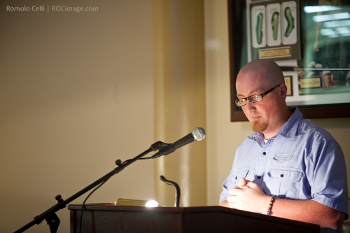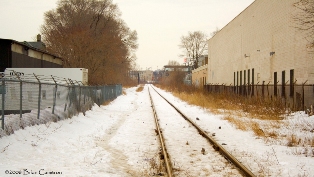Following a fun afternoon of poetry in Avon, NY (see part 1), I headed to St. John Fisher college in Rochester, NY, for the May edition of the Rochester Poets reading series. I was one of two featured poets, the other being my friend Matt Smythe.
 Matt and I both went to high school in Canandaigua, NY, a picturesque town about 40 minutes from Rochester. The town sits on one end of Canandaigua Lake, with Naples at the other. Matt graduated in 1990 and I escaped the following year. We never hung around in high school, although we each knew the other existed, and we had some friends in common. We both left town after graduating and didn’t see each other again for more than 15 years.
Matt and I both went to high school in Canandaigua, NY, a picturesque town about 40 minutes from Rochester. The town sits on one end of Canandaigua Lake, with Naples at the other. Matt graduated in 1990 and I escaped the following year. We never hung around in high school, although we each knew the other existed, and we had some friends in common. We both left town after graduating and didn’t see each other again for more than 15 years.
In 2008, our mutual friend Travis Nixon died after a long battle with cancer. He was 36 years old. Travis owned the gift and game shop Coyote’s Den in Canandaigua and served on the city council. He was beloved by the community, and people of all ages were at his funeral. Matt and I were among them, and we talked for a few minutes after the funeral. Matt had spent nearly a decade in the Army, then ended up getting an advanced degree in literature with a focus on poetry. Not long after, I sent Matt an early version of the manuscript for Unexpected Sunlight.
Sending out a manuscript to other poets is a tricky business. For the most part, in my experience, you’ll get no comments at all. Occasionally you’ll get a short note. If you’re very lucky, you’ll get what I received from Matt – detailed, poem by poem, line by line analysis of the manuscript with suggestions and comments. Matt’s careful eye made the manuscript much better than it would have been, a fact for which I’ll be forever grateful.
Fast-forward to 2010. By some freak of publishing fate, the lovely folks at FootHills Publishing decided to risk the complete collapse of their 25-year-old press by putting out Unexpected Sunlight. That meant it was time for me to start organizing readings wherever I could. And although I’d lived in Rochester from 2000-2007, I’d been completely inactive in the poetry scene. The two names I knew were Frank Judge and Writers & Books. I contacted both about doing a feature reading, and Frank responded to say he had a slot in two weeks and could I make it? I accepted and requested that it be a co-feature for Matt and me.
And so on Wednesday, May 5, a group of about 30 people gathered in the Hughes Rotunda of the Wilson Education Building at St. John Fisher College. Several of the attendees had never been to a poetry reading. A friend was there whom I’d last seen her in 1991. Two of my sister’s friends were there (huzzah!) as were many other friends from my years in Rochester. Thanks to everyone who attended. It was wonderful to have you all there.

The reading itself was a lot of fun. Matt and I asked Frank to call us both up to the front of the room so we could flip a coin to see who would go first. My side of the coin came up and I led off. I read a mix of poems from Unexpected Sunlight and some newer poems, too. I also read two poems of Matt’s (“Stoplight Red” and “The Air On Bourbon”), because we’d decided in advance to each read the other’s work. I love Matt’s writing and enjoy reading it aloud even more.
Matt followed me with a strong set, some of which came from his master’s thesis, a book-length collection called All Water. Matt is passionate about music and fishing and human relationships, all of which comes through in his work. As I mentioned, he also spent eight years in the military, and his experiences certainly inform his writing. Matt read two of my poems, too – “Come with me, Shelby†and “Lottery.â€
All in all, a rewarding evening of poetry, surrounded by friends and fellow poets. And I don’t think it will be the last time Matt and I work together. Stay tuned!
Coming up in part 3: I was the guest speaker in two classes at Monroe Community College on May 6. It was a transformative experience. Read part 3.
Thanks to Rome Celli for the photos used in this story.




 Sure, reading poetry to a room full of people is fun, and I’ll do it whenever the opportunity presents itself. But on Thursday, May 6, I had a chance to experience poetry in a totally different way – by talking about it in two classes at Monroe Community College (MCC) in Rochester.
Sure, reading poetry to a room full of people is fun, and I’ll do it whenever the opportunity presents itself. But on Thursday, May 6, I had a chance to experience poetry in a totally different way – by talking about it in two classes at Monroe Community College (MCC) in Rochester.

 I traveled to the Rochester, NY, area this week for a series of poetry events. On Wednesday, May 5, I made my first stop in Avon, NY, about 30 minutes from Rochester. I joined Alan Casline, John Roche, Paulette Swartzfager, Stephen Lewandowski, Dwain Wilder and Ken Warren for an afternoon of poetry beside the cannons in the park. The park is in the middle of a traffic circle in downtown Avon, so our reading was accompanied by the slow circling of cars and trucks and the occasional, slightly confused pedestrian.
I traveled to the Rochester, NY, area this week for a series of poetry events. On Wednesday, May 5, I made my first stop in Avon, NY, about 30 minutes from Rochester. I joined Alan Casline, John Roche, Paulette Swartzfager, Stephen Lewandowski, Dwain Wilder and Ken Warren for an afternoon of poetry beside the cannons in the park. The park is in the middle of a traffic circle in downtown Avon, so our reading was accompanied by the slow circling of cars and trucks and the occasional, slightly confused pedestrian. Alan Casline [pictured at left] brought ambrosia with mead to share with the group. It was a gorgeous afternoon, so we sprawled out on the grass to listen and to soak up the sun. Alan read several poems, including one about a hike he and Steve Lewandowski went on that included a line about Steve sliding down a snow-covered bank “like a third grader on a lunch tray.”
Alan Casline [pictured at left] brought ambrosia with mead to share with the group. It was a gorgeous afternoon, so we sprawled out on the grass to listen and to soak up the sun. Alan read several poems, including one about a hike he and Steve Lewandowski went on that included a line about Steve sliding down a snow-covered bank “like a third grader on a lunch tray.” John Roche [pictured at left] paid homage to the location of the reading will several poems about Avon, the town where he makes his home. One of his pieces was a protest poem about the closing of a local watering hole. I enjoyed John’s intensely specific words of protest — it’s important to be reminded that protest poems can be very, very local.
John Roche [pictured at left] paid homage to the location of the reading will several poems about Avon, the town where he makes his home. One of his pieces was a protest poem about the closing of a local watering hole. I enjoyed John’s intensely specific words of protest — it’s important to be reminded that protest poems can be very, very local. Stephen Lewandowski, [pictured at left] a longtime chronicler of — and advocate for — the Finger Lakes region, ended his set of poems with one that took me completely by surprise. It was a poem about the increase of the signal strength of Jazz90.1 (WGMC) and Steve’s resulting ability to hear Oscar Peterson and other jazz greats at his Finger Lakes home. What made this poem so surprising for me is that boosting the station’s power was a project I oversaw as station manager of Jazz90.1 from 2002-2004. What was even more surprising was that it was a complete coincidence that Steve read the piece — he didn’t realize my connection to the station. I was very moved to hear someone who so appreciated the results of all those thousands of hours of fundraising and advocacy.
Stephen Lewandowski, [pictured at left] a longtime chronicler of — and advocate for — the Finger Lakes region, ended his set of poems with one that took me completely by surprise. It was a poem about the increase of the signal strength of Jazz90.1 (WGMC) and Steve’s resulting ability to hear Oscar Peterson and other jazz greats at his Finger Lakes home. What made this poem so surprising for me is that boosting the station’s power was a project I oversaw as station manager of Jazz90.1 from 2002-2004. What was even more surprising was that it was a complete coincidence that Steve read the piece — he didn’t realize my connection to the station. I was very moved to hear someone who so appreciated the results of all those thousands of hours of fundraising and advocacy. Unfortunately, I had to leave right before Dwain Wilder [pictured at left] and — I assume — Paulette Swartzfager read (sorry!), so that I could make it to my own reading that night at St. John Fisher. But I thoroughly enjoyed spending an afternoon in the company of such insightful people. I hope the “poetry at the cannons” reading will be just the first in a long series of such events in Avon.
Unfortunately, I had to leave right before Dwain Wilder [pictured at left] and — I assume — Paulette Swartzfager read (sorry!), so that I could make it to my own reading that night at St. John Fisher. But I thoroughly enjoyed spending an afternoon in the company of such insightful people. I hope the “poetry at the cannons” reading will be just the first in a long series of such events in Avon.





